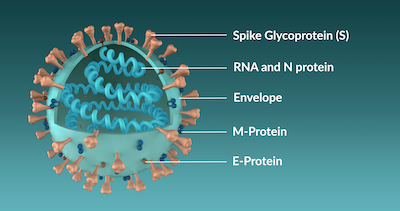
Metformin treats COVID-19 and prevents Long COVID
If you or someone you know has been diagnosed with COVID-19, this handout provides the basic information and references about metformin to treat COVID-19. You can save or print the handout to share with your physician.
The COVID-OUT clinical trial is a randomized, controlled, blinded study that enrolled over 1300 participants. It evaluated three existing medications as treatments for COVID-19. The research team led by the University of Minnesota reported that metformin proved to be an effective treatment for COVID-19, reduced Long COVID incidence, and lowered the amount of the SARS-CoV-2 virus.
COVID-19 outcomes:
- Metformin reduced emergency room visits, hospitalization, or death by 42%
- When taken immediately after symptoms, metformin reduced serious outcomes by over 50%
- Ivermectin and low-dose fluvoxamine did not improve outcomes of COVID-19
Long COVID outcomes:
- Metformin reduced the incidence of Long COVID by over 41% when taken within 7 days of COVID symptoms
- When taken within 4 days of symptom onset, metformin reduced Long COVID incidence by 63%
- Treatment with ivermectin and low-dose fluvoxamine did not improve Long COVID
Viral load outcomes:
- Metformin significantly reduced the mean SARS-CoV-2 viral load by 3.6-fold compared to placebo
- No reduction in the amount of virus was found for ivermectin or low-dose fluvoxamine
- COVID-19 has spread around the world causing high mortality and suffering, as well as significant economic impacts.
- Over 6.9 million people worldwide have died of the virus, with the United States having the highest number of deaths and infections.
- Vaccines against SARS-CoV-2 have been approved, but they are not available in all locations and some choose not to be vaccinated.
- Drugs developed specifically to treat COVID-19 infection may be difficult to obtain and are not available to many parts of the world.
- Long Covid is a growing burden, without proven treatments or preventions.
- Inexpensive, existing treatments are needed to reduce the impact of infection.
- The Parsemus Foundation supported the use of simple, inexpensive therapies for COVID-19 using medications that are already available and proven safe.
- The foundation supported enrollment efforts for several clinical trials of drugs for COVID-19 treatment, including the COVID-OUT study.
- We continue to help spread the word about metformin for treatment of COVID-19.
Project Topics
Metformin found to prevent severe symptoms of COVID-19 and reduce the chance of developing Long COVID
The University of Minnesota led the COVID-OUT clinical trial that finished enrolling participants in 2022. It is a large rigorous study to understand if common, inexpensive medicines (metformin, fluvoxamine or ivermectin) prevent severe COVID-19 infection and Long Covid symptoms. The initial results on the impact of the treatments on COVID-19 were published in the New England Journal of Medicine. The results of the analysis of Long COVID was published in The Lancet Infectious Diseases and viral load results are available as a preprint.
The main findings were that metformin reduced emergency room visits, hospitalization, or death from COVID-19 infection by 42%. When taken immediately after symptoms, metformin reduced serious outcomes by over 50%.
There was also a 41% decrease in the incidence of Long Covid when metformin was taken shortly after COVID-19 infection. When taken within four days of symptoms, metformin reduced Long COVID by 63%. Ivermectin and low-dose fluvoxamine did not improve outcomes of COVID-19 or Long Covid.
Further analyses indicated that metformin (but not ivermectin or fluvoxamine) had anti-viral effects. Metformin decreased the amount of COVID-19 virus (SARS-CoV-2) 3.6 fold.
From the university’s press release: “We are pleased to contribute to the body of knowledge around COVID-19 therapies in general, with treatments that are widely available,” said Carolyn Bramante, MD, principal investigator of the study and an assistant professor of internal medicine and pediatrics at the University of Minnesota Medical School.
Metformin is the first COVID treatment proven to reduce serious outcomes of COVID-19 infection, reduce Long COVID incidence, and lower the level of the COVID-19 virus. It is safe, accessible and low-cost. Metformin is also one of the most commonly prescribed medications in the United States and globally, taken by more than 150 million people each year. This medication should be considered as the first globally-available treatment for COVID-19.
Additional facts about the study:
- 1323 individuals participated in the study.
- Only adults with a BMI (body mass index) greater than or equal to 25kg/m2 were enrolled.
- Pregnant women were included in the metformin group.
- The majority of participants were vaccinated, and metformin was effective for both vaccinated and unvaccinated individuals.
- Fluvoxamine doses were a third to half as much as used in previous studies in an attempt to avoid side effects.
FAQ on the COVID-OUT Study
Metformin lowers blood sugar and inflammation by activating an enzyme called AMPK. This activity also appears to reduce angiotensin-converting enzyme 2 (or ACE2), which serves as a gateway for COVID-19 to enter and infect cells. Thus, the way metformin works to control blood sugar might also help to control coronavirus infection (see this article in Everyday Health). The COVID-OUT clinical trial also reported that metformin was effective in reducing the amount of virus in study participants.
A number of inexpensive, safe, existing medications have been studied as possible treatments for COVID infection. With limited profit potential and lack of research funding, it has taken time for the required clinical studies to be completed.
Visit your doctor to learn about treatment options. You can bring information like that included in this website to discuss metformin with your healthcare provider.
Strong observational and randomized clinical trial data exists to support the use of metformin as a treatment for COVID. It is up to regulatory bodies (such as the U.S. FDA) whether they will officially add metformin to approved COVID treatments guidelines.
See Additional Resources below.
Background on metformin for COVID-19 treatment
The results of the COVID-OUT clinical trial were preceded by several studies that supported the concept that metformin might be used to effectively treat COVID-19. Metformin lowers blood sugar and inflammation by activating an enzyme called AMPK. This activity also appears to reduce angiotensin-converting enzyme 2 (or ACE2), which serves as a gateway for COVID-19 to enter and infect cells.
Metformin has been used for years off-label to treat other metabolic conditions like obesity, cardiovascular disease, and high blood pressure — the same risk factors for poor outcomes after COVID-19 infection. Metformin is also inexpensive and safe to use during pregnancy.
Early observational studies
A publication by an Italian team provided evidence that COVID-19 patients with hyperglycemia who were treated with insulin infusion had a lower risk of severe disease than patients without insulin infusion. And scientists in China, France, and the U.S. reported that patients with the virus and pre-existing Type 2 diabetes had better outcomes if they had improved glycemic control or were on diabetes medication (metformin), and worse outcomes with uncontrolled hyperglycemia.
Controlled clinical trials
The Together Trial was a randomized, controlled clinical trial conducted in Brazil that reported on the use of metformin and other medications to treat COVID-19. Of 1497 participants, 327 individuals were provided metformin. The study did not find that metformin reduced hospitalizations or emergency room visits. However, there were several methodological differences from the COVID-OUT trial. The Together Trial reported that high-dose fluvoxamine reduced the chance of COVID-19-related hospitalization.
The COVID-OUT double-blind, controlled, randomized clinical trial evaluated the impact of metformin, fluvoxamine, ivermectin, and combinations as a treatment for 1323 newly diagnosed COVID-19 participants. Metformin lowered the odds of emergency department visits, hospitalizations, or death. It also reduced the occurrence of Long Covid. However, fluvoxamine and ivermectin did not have a significant effect.
A drug derived from metformin (called metformin glycinate) has recently been shown to reduce the COVID viral load in cell cultures by 98%. Metformin glycinate also reduced the amount of virus and the need for supplemental oxygen in a small clinical trial of COVID-19-infected individuals. The COVID-OUT trial also found that the viral load in participants taking metformin shortly after COVID-19 infection had a significantly reduced level of SARS-CoV-2 virus.
A small foundation’s role in the fight against COVID-19
As a small, agile nonprofit organization, the Parsemus Foundation was able to pivot from our regular funded programs to a new focus on COVID-19 treatment.
The Parsemus Foundation provided direct funding and/or support to three clinical trials: 1) an evaluation of the impact of the MMR (measles, mumps and rubella) vaccine on COVID-19 infection outcomes, 2) two studies evaluating existing, safe medications to individuals who recently tested positive for COVID-19.

Additional Resources
Clinical Trials
- ACTIV-6 National Institutes of Health evaluating existing medication
Resources for the COVID-OUT trial
- University of Minnesota COVID-OUT Information
- Publication in the New England Journal of Medicine
- Publication in The Lancet Infectious Diseases
- Preprint of the viral load data
- Parsemus Foundation media resources page
- Parsemus Foundation press release June 9, 2023
- University of Minnesota press release June 9, 2023
- University of Minnesota press release May 2, 2024
- This handout provides basic information and references about metformin to treat COVID-19.
Publications on COVID-19 and Metformin
- Bode B, Garrett V, Messler J, et al. (2020). Glycemic characteristics and clinical outcomes of COVID-19 patients hospitalized in the United States. J Diabetes Sci Technol 14(4):813-821. (free full text)
- Bramante CT, Beckman KB, Mehta T et al. (2024). Favorable antiviral effect of metformin on severe acute respiratory syndrome coronavirus 2 viral load in a randomized, placebo-controlled clinical trial of coronavirus disease 2019. Clinical Inf Dis May 1, 2024. (abstract)
- Bramante CT, et al. (2023). Outpatient treatment of COVID-19 and incidence of post-COVID-19 condition over 10 months (COVID-OUT): a multicentre, randomised, quadruple-blind, parallel-group, phase 3 trial. Lancet Inf Dis Jun 9 online (free full text).
- Bramante CT, Huling JD, Tignanelli, CJ, et al. (2022). Randomized trial of metformin, ivermectin, and fluvoxamine for Covid-19. N Engl J Med 2022; 387:599-610. (free full text)
- Bramante C, Ingraham N, Murray T, et al. (2021). Metformin and risk of mortality in patients hospitalised with COVID-19: a retrospective cohort analysis Lancet Healthy Long 2(1):e34–41. (free full text)
- Ibrahim S, Lowe JR, Bramante CT, et al. (2021). Metformin and Covid-19: Focused review of mechanisms and current literature suggesting benefit. Front. Endocrinol. 12:587801. (free full text).
- Reis G, Silva EAM, Silva DCM, et al. Effect of early treatment with metformin on risk of emergency care and hospitalization among patients with COVID-19: The TOGETHER randomized platform clinical trial. Lancet Reg Health Am Feb; 6: 100142. (free full text).
- Ojeda-Fernández L, Foresta A, Macaluso G, et al. (2022). Metformin use is associated with a decrease in the risk of hospitalization and mortality in COVID-19 patients with diabetes: A population-based study in Lombardy. Diabetes Obes Metab. 1–8 (free full text).
- Sardu C, D’Onofrio N, Balestrieri ML, et al. (2020). Outcomes in patients with hyperglycemia affected by Covid-19: Can we do more on glycemic control? Diabetes Care 43(7): 1408–1415. (free full text)
- Usman A, Bliden KP, Cho A, et al. (2022). Metformin use in patients hospitalized with COVID-19: lower inflammation, oxidative stress, and thrombotic risk markers and better clinical outcomes. J Thromb Thrombolysis. Jan 18 : 1–9. (free full text)
- Ventura-Lopez C, Cervantez-Luevano K, Aguirre-Sanchez JS, et al. (2022). Treatment with metformin glycinate reduces SARS-CoV-2 viral load: An in vitro model and randomized, double-blind, Phase IIb clinical trial. Biomed Pharmacother 152: 113223. (free full text).
- Zhu L, She Z, Cheng X, et al. (2020). Association of blood glucose control and outcomes in patients with COVID-19 and pre-existing Type 2 diabetes. Cell Metabolism 31, 1068–1077. (free full text)
Select media coverage of COVID treatment using existing medications
- Pelley L. Common, inexpensive diabetes drug could cut long COVID risk, study finds. CBC. Jun 10, 2023.
- Thompson D. Diabetes Med Metformin Might Help Prevent Long COVID. US News & World Report. Jun 9, 2023.
- Novak S. Diabetes drug metformin may cut the risk of long covid by 41 per cent. New Scientist. Jun 9, 2023.
- Wise J. Covid-19: Metformin reduces the risk of developing long term symptoms by 40%, study finds. BMJ. Jun 8, 2023.
- Rosenbaum L. A cheap drug used for anti-aging and weight-loss may also treat long COVID, study finds. Yahoo. Jun 8, 2023.
- Olson J. Common drug reduces long COVID, University of Minnesota study shows. Star Tribune. Jun 8, 2023.
- Hutto E. Finally, a potential therapy to prevent Long COVID— Diabetes drug found to reduce chance of long COVID in clinical trial preprint. MedPage Today. Mar 21, 2023.
- Ducharme J. Researchers are getting closer to learning how to treat and prevent Long COVID. Time Mar 16, 2023.
- Crist, C. ‘Breakthrough’ Study: Diabetes Drug Helps Prevent Long COVID. WebMD Mar 9, 2023.
- Melville N. Metformin linked to reductions in COVID-19 viral load. Medscape Feb 21, 2023.
- Wu KJ. Trying to stop Long COVID before it even starts. The Atlantic Jan 19, 2023.
- Tran TH. An old diabetes drug may protect you against Long COVID. The Daily Beast Dec 28, 2022.
- Wilson FP. Ivermectin for COVID-19: Final nail in the coffin. Medscapes Oct 31, 2022.
- Simon A. U of M study finds diabetes medication can lower odds of COVID hospitalization, death. KARE 11 Aug 17, 2022.
- Sidik SM. The hunt for drugs for mild COVID: scientists seek to treat those at lower risk. Nature Jul 18, 2022.
- Landhuis E. These are the latest COVID treatments. Scientific American Jan 21, 2022.
- Avril, T. Another old drug is being tried vs. COVID-19, and might actually help. Philadelphia Inquirer Jan 20, 2022.
- Putka S. Doctor submits fluvoxamine EUA application to FDA. MedPage Today Dec 29, 2021.
- Landhuis E. The Challenge and Promise of Getting Oral COVID Drugs Into Practice. Medscape Dec 17, 2021.
- Landhuis E. Investigating antidepressants’ surprising effect on COVID deaths. Scientific American Nov 12, 2021.
- Suliman A. Antidepressant drug shows promise in treating covid-19, study finds. Washington Post Oct 28, 2021.
- Landhuis, E. The antidepressant fluvoxamine can keep COVID-19 patients out of the hospital. Science News Oct 27, 2021.
- Harris J. Continuing the fight against COVID-19. University of Minnesota Foundation Summer 2021.
- LeFee, S. Common diabetes drug shows promise as treatment for COVID-19 lung inflammation. UC San Diego Health Jun 8, 2021.
- Landhuis E. Scientists Seek Covid Treatment Answers in Cheap, Older Drugs. California Healthline Mar 26, 2021.
- Stone S. New COVID-19 treatment trial is first to include pregnant women. ABC Denver Mar 31, 2021.
- Raddatz K. U Of M Medical School studies whether diabetes drug is effective against COVID. CBS Minnesota Mar 19, 2021.
- Kabani M. COVID-19 research points to repurposed drugs. 60 Minutes Mar 7, 2021.
- Snowbeck C. University of Minnesota to expand study of whether common diabetes drug could treat COVID. Star Tribune Mar 2, 2021.
- Gupta S, Kane A. Everything old is new again: Repurposing drugs to treat Covid-19. CNN Feb 27, 2021.
- Walters K. MMR vaccine shows some COVID-19 protection. HCPlive Feb 26, 2021.
- Sukhatme V, Sukhatem V. A call to action: Immediate deployment of select repurposed drugs for COVID-19 outpatient treatment. HealthAffairs Feb 9, 2021.
- McMaster University. New study to test drugs for early COVID-19 infection. EurekAlert Feb 9, 2021.
- Emanuel E, Bright R, Gounder C, Borio L, Osterholm M, Gawande A. Opinion: Vaccines alone won’t solve the pandemic. Here are 3 other things we must do. Washington Post Feb 5, 2021.
- Landhuis, E. The antidepressant fluvoxamine could keep mild COVID-19 from worsening. Science News Feb. 1, 2021.
- Klausner J. Existing drugs could help treat covid-19. How do we know when to use them? Washington Post Jan 27, 2021.
- Al-Agba N. What if I can’t get the COVID-19 vaccine right now? KitSap Sun Dec 26, 2020.
- Rapaport L. Metformin linked with lower risk of death from COVID-19 in people with Type 2 diabetes. Everyday Health Jun 9, 2020.
- Apple S. Un-miracle drugs could help tame the pandemic. WIRED Apr 20, 2020.
- Last updated on December 9, 2024
Tell us what you think
Human Health News

Nanotechnology targets cancer through breast ducts
Breast cancer remains a significant health challenge worldwide. While advancements in treatment have improved survival rates, the search for more targeted and effective therapies continues. Nanotechnology-based intraductal drug delivery aims to revolutionize local treatment and prevention of breast cancer by delivering nanocarriers with therapeutic agents directly to the site of the disease.

Vision loss and dementia risk
A recent study found that up to 19% of dementia cases may be attributable to impaired vision. The study, published in JAMA Ophthalmology, showed that vision loss may have even more of an impact on the risk of dementia than previously thought. Hearing loss is also considered a modifiable risk factor for dementia, supporting the notion that sensory engagement is critical for brain health.

Blood tests predict cardiovascular disease
Cardiovascular disease is the leading cause of death worldwide. Heart attacks, strokes, and other heart-related conditions claim millions of lives each year — more than cancer. In the U.S., cardiovascular disease kills someone every 33 seconds, and is responsible for more than 20% of all deaths, according to the Centers for Disease Control. But what if a simple blood test could help predict heart disease decades in advance?

Nanotechnology targets cancer through breast ducts
Breast cancer remains a significant health challenge worldwide. While advancements in treatment have improved survival rates, the search for more targeted and effective therapies continues. Nanotechnology-based intraductal drug delivery aims to revolutionize local treatment and prevention of breast cancer by delivering nanocarriers with therapeutic agents directly to the site of the disease.

Vision loss and dementia risk
A recent study found that up to 19% of dementia cases may be attributable to impaired vision. The study, published in JAMA Ophthalmology, showed that vision loss may have even more of an impact on the risk of dementia than previously thought. Hearing loss is also considered a modifiable risk factor for dementia, supporting the notion that sensory engagement is critical for brain health.

Blood tests predict cardiovascular disease
Cardiovascular disease is the leading cause of death worldwide. Heart attacks, strokes, and other heart-related conditions claim millions of lives each year — more than cancer. In the U.S., cardiovascular disease kills someone every 33 seconds, and is responsible for more than 20% of all deaths, according to the Centers for Disease Control. But what if a simple blood test could help predict heart disease decades in advance?

Regional variation in Alzheimer’s and dementia diagnoses
Different parts of the United States have different rates of Alzheimer’s diagnoses. Scientists from the University of Michigan determined that regional variation was due to risk factors related to the specific population as well as the intensity of new cases diagnosed.


